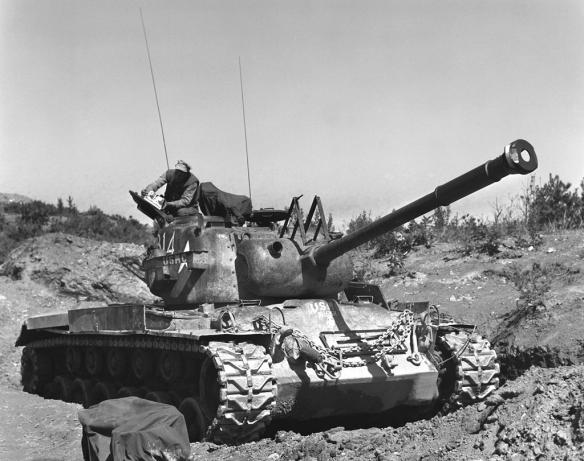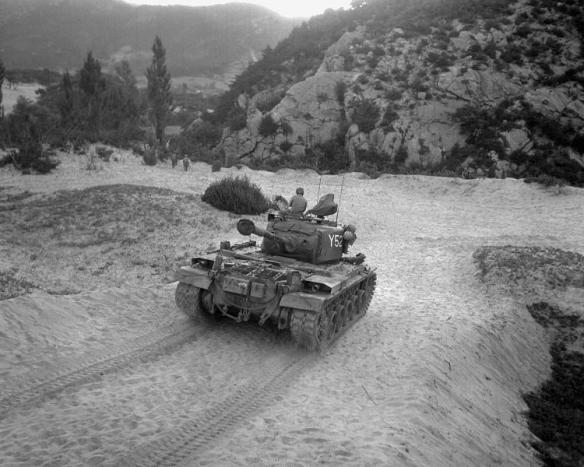Bridging the Gap
A strong breeze blew under a sunny sky as I drove up to the gate at Fort Snelling in Minneapolis. Climbing down through the top hatch of an M46 Patton tank, I began a profound journey. Wind gusts swirled around the tank body, but were they also ghostly voices of the crew? I turned quickly in the small space behind the assistant driver and banged my head on the breech block, a moment of searing pain. I panicked. Did I hear enemy fire? Was that one of our tracks blown off, making us helpless to Chinese rockets, mortars, and machine guns? I climbed out quickly, gulping for air, orienting myself to now, as far from the Korean War as possible. Without thinking I slid off the turret and down a fender, the way I’d seen Marines do in film clips, and nearly shattered my knees. This was hands on research, maybe more hands on than I had anticipated. 
Two days later, waiting for routine maintenance at a car dealership, I struck up a conversation with another customer. We ended up talking about our work, and I shared my tank experience. Some people would say that him being part of a Marine tank crew in Vietnam was a coincidence and perhaps it was, but the conversation shifted to a deeper level when he learned I had physically encountered a tank. Rather than coincidence, hands on research allows a writer to be more perceptive to the connections that surround us. I teach at a polytechnic university where two ideas are dominant: “hands on” learning and the importance and need for research. Taken together, these have created a culture of hands on research. Teaching creative writing under this umbrella is a challenge, as my students genuinely struggle with the idea of researching something not part of their actual experience. What they want is information, process, and product; for example, if you accumulate data and apply that data through an empirical process, then you should be able to produce a reliably uniform bottle cap. A brief listing of representative undergraduate programs may illustrate the weight of this paradigm: Apparel Design and Development, Construction, Food Science and Technology, Information Technology Management, Packaging, and so forth. Accumulating data as part of creative writing does not give my students trouble. Process to product as part of research based fiction does, especially the idea that fiction, while it has specific conventions that can be learned, does not necessarily need to be a part of the writer’s verifiable experience in order to be meaningful. For half a dozen semesters or more, I struggled with how to help my students find a way to embrace the idea that while fiction may not necessarily be factual, they should engage in meaningful research toward a truthful product. I did not have a great deal of success until I began working on a novel set, in part, in 1951 during the Korean War in a Marine Corps tank battalion. Chapter two appeared as “Better Than Dead” in the summer 2011 issue of North American Review. I knew very little about the Korean War, America’s forgotten war. As a result, I embarked on an intensive research project on the war and on daily life in Korea and in the U.S. While I accumulated a considerable amount of knowledge from written sources about the Korean War, tanks, and Marines, as well as life in the ‘50s, something was missing. I had lots of facts and figures but little emotional connection. Then the mantra of “hands on learning” floated into my mind. After additional searching, I discovered that Fort Snelling, a nearby military base, had a museum holding an M46 Patton tank in partial restoration. The director, Chief Warrant Officer 3 Nick Goodwin, allowed me to crawl on, around, under, and in a tank used in Korea.  As I climbed down into the tank, I began to understand hands on research and to build a personal experience to share with my students. Five men inhabited a tiny space while war raged outside. I wondered how they could even turn around. Standing next to the breech block, imagining the roar of the blow back exhaust fan, took me to a deeper sense of what they endured day and night while being fired on by the enemy. In short, I was changed profoundly from a person doing research to a human being closer to sensing the terrors of war. What I would produce from this sense might be fictional and not a part of my actual experience, but it certainly would be truthful. Now, I share this experience with my students each semester, bridging the gap between factual and fictional to carry on a historical truth.
As I climbed down into the tank, I began to understand hands on research and to build a personal experience to share with my students. Five men inhabited a tiny space while war raged outside. I wondered how they could even turn around. Standing next to the breech block, imagining the roar of the blow back exhaust fan, took me to a deeper sense of what they endured day and night while being fired on by the enemy. In short, I was changed profoundly from a person doing research to a human being closer to sensing the terrors of war. What I would produce from this sense might be fictional and not a part of my actual experience, but it certainly would be truthful. Now, I share this experience with my students each semester, bridging the gap between factual and fictional to carry on a historical truth.
Brian Fitch lives and works in Western Wisconsin with his wife Jenny and their cat Moxie. (Our dog, Ivy, died May 22 this year.) Brian is featured in issue 296.3, Summer 2011.
Recommended
Nor’easter
Post-Op Appointment With My Father
Cedar Valley Youth Poet Laureate | Fall 2024 Workshop





